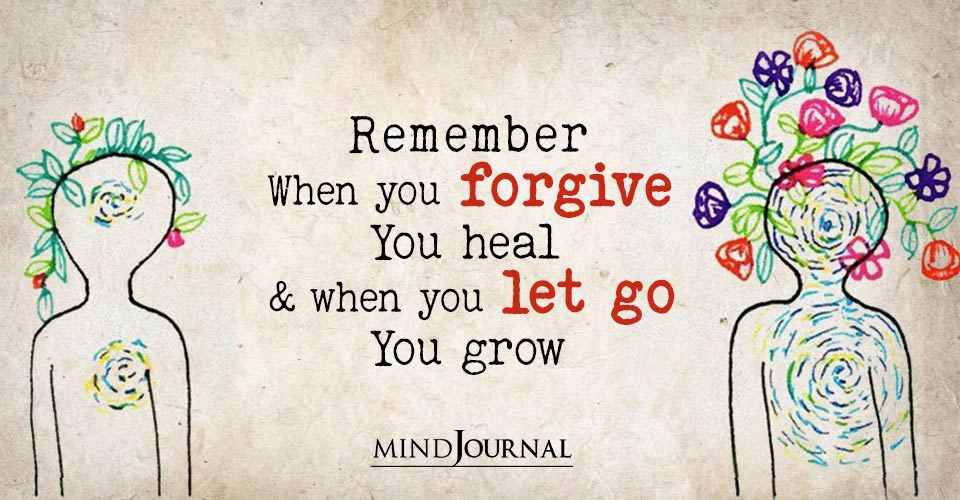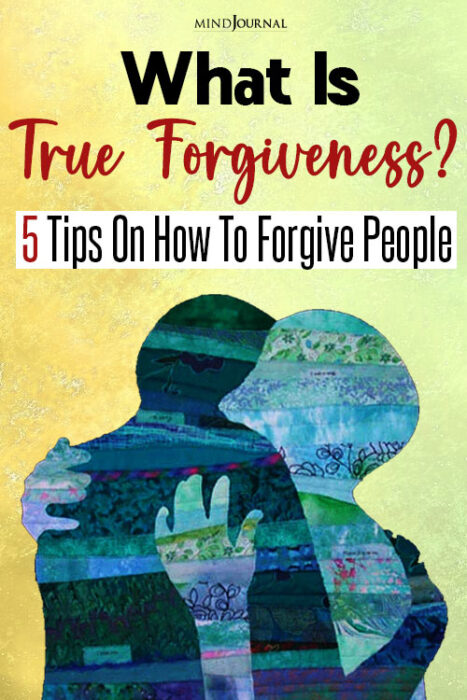Have you ever held onto anger and resentment because someone did you dirty? Most of us often become trapped by the weight of bitterness and make wrong decisions that affect us more than it affects others. This is where true forgiveness comes in. But exactly what is true forgiveness?
There is a transformative power hidden within the philosophy of forgiveness. True forgiveness has the potential to liberate us from the chains of bitterness, allowing us to heal, grow, and rediscover the joy of living.
Let’s explore the depths of what is true forgiveness and learn how to forgive people so that we can be liberated from the pain and bitterness.
What is True Forgiveness?
Forgiveness is often misunderstood as a simple act of pardoning someone for their mistakes or transgressions. However, true forgiveness encompasses much more than that.
True forgiveness is a profound internal process that involves letting go of resentment, anger, and the desire for revenge. It goes beyond surface-level apologies and requires a genuine shift in our hearts and minds.

According to researchers, forgiveness is “a willingness to abandon one’s right to resentment, negative judgment, and indifferent behavior toward one who unjustly injured us, while fostering the undeserved qualities of compassion, generosity and even love toward him or her.”
Related: How The 4 Stages Of Forgiveness Can Help You
So what is true forgiveness? At its core, true forgiveness is an act of compassion towards ourselves and others. It involves acknowledging the pain caused by the wrongdoing, but consciously choosing to release the negative emotions associated with it.
In a way, forgiveness restores hope for the future. It opens up the possibility for us to reconcile with the one who wronged us (if they apologize and accept forgiveness) or find strength “to seek justice in the past injustice that they suffered.”
However, forgiveness does not mean forgetting or condoning the actions, rather freeing ourselves from the burden they impose.
The Philosophy of Forgiveness
Is the weight of anger and resentment holding you back from experiencing true joy and freedom? Forgiveness is a philosophy that goes beyond mere pardoning and offers profound liberation for both the forgiver and the forgiven. Let’s take a look at its philosophical underpinnings and understand the power of true forgiveness –
1. Embracing Imperfection and Humanity
To truly understand the philosophy of forgiveness, we must recognize the inherent imperfections of human nature. We are all fallible beings, capable of making mistakes and causing harm. Forgiveness allows us to accept this reality and acknowledge that nobody is exempt from their own flaws.
By granting forgiveness, we extend empathy and compassion to ourselves and others, recognizing our shared humanity.
2. Liberation from Emotional Bondage
When we hold onto grudges and refuse to forgive, we inadvertently chain ourselves to the past, allowing negative emotions to control us. The philosophy of forgiveness teaches us to break free from this emotional bondage.
It empowers us to reclaim our emotional well-being by releasing the negative energy that weighs us down. In forgiving, we find freedom, inner peace, and the capacity to create a brighter future.

3. Cultivating Empathy and Understanding
When you know what is true forgiveness, you realize that it is a profound exercise in empathy and understanding. It requires us to put ourselves in the shoes of the person who has wronged us, seeking to comprehend their motivations, struggles, and limitations.
By doing so, we open ourselves to a broader perspective and the possibility of finding common ground. True forgiveness fosters compassion and bridges the gaps that separate us from one another.
Related: 30+ Inspiring Quotes About Forgiveness To Let Go Of The Painful Past
Is Forgiveness Easy?
No. True forgiveness never comes easy. Forgiveness requires you to step out of your pain. It requires that you step out of all the anger, emotional turmoil and hatred. It requires you to detach yourself from the intense need for revenge. The need for justice. The need for closure. And that is never an easy step to take.
When you are hurt, all you want is for the other person to realize how much they hurt you. You want them to be empathetic and compassionate with you. To show genuine regret and apologize. And when that doesn’t happen, which is most of the time, your heart fills with resentment. Anger and hatred take over you and you become consumed by feelings of vengeance.
When you are trapped in this state of negative thoughts and emotions, it can be really REALLY difficult for you to forgive someone who has wronged you. But as they say, forgiveness is less about them and more about you. It is about you releasing yourself from all the emotional pain, hatred and the need for revenge.
This simple shift in your mindset can make forgiveness an easier process for you. Forgiveness is about you choosing to free yourself from the pain and suffering that the other person has caused you. Forgiveness is about letting go of all the negativity and finding the courage to take a step forward.
So no, it’s not easy to forgive. But do it anyway. That’s where growth exists. That’s how you become stronger. That’s how you become yourself again. That’s how you learn what is true forgiveness.
Related: 8 Reasons Why You Should Forgive The People Who Hurt You

How to Forgive People
Not sure how to forgive someone who has truly hurt you? Here are a few practical steps to cultivate forgiveness in your life.
1. Acknowledge and Process Your Emotions
Before embarking on the journey of forgiveness, it is crucial to acknowledge and process our emotions. Allow yourself the space to feel anger, hurt, and disappointment. Give yourself permission to grieve the pain caused by the actions of others.
Engage in healthy coping mechanisms such as journaling, talking to a trusted friend, or seeking professional guidance if needed. By addressing our emotions, we lay the groundwork for genuine forgiveness.
2. Shift Your Perspective
One of the most powerful ways to forgive is by shifting our perspective. Instead of dwelling on the harm inflicted upon us, we can choose to focus on personal growth and the lessons learned from the experience.
Recognize that forgiveness is not a sign of weakness but an act of strength and resilience. Embrace the opportunity to evolve and expand your own capacity for compassion. This is forgive people.
3. Practice Self-Compassion
Forgiveness begins with extending compassion to ourselves. Often, we blame ourselves for the pain we have endured or carry guilt for past actions. True forgiveness necessitates forgiving ourselves for our imperfections and mistakes.
Embrace self-compassion by practicing self-care, engaging in activities that bring you joy, and nurturing a positive inner dialogue. By treating ourselves with kindness, we create a foundation for forgiving others.
Related: Can You Forgive Someone Who Has Not Directly Hurt You?
4. Communicate and Seek Understanding
In some cases, forgiveness may involve open and honest communication with the person who has wronged us. Express your feelings and concerns, allowing them to understand the impact of their actions.
It is essential to approach these conversations with a genuine intention to find resolution and rebuild trust. However, remember that forgiveness is a personal journey, and it is not always necessary to engage directly with the person involved.
5. Embrace the Power of Release
Ultimately, forgiveness is an act of release. It is a conscious choice to let go of the past and embrace a future free from the shackles of resentment. Embrace forgiveness as a gift to yourself, allowing it to liberate your heart and mind.
As you release the burden of anger and resentment, you create space for healing, personal growth, and the possibility of restoring broken relationships. This is perhaps the best advice on how to forgive people.

Takeaway
So what is true forgiveness? True forgiveness is a transformative philosophy that liberates us from the pain and bitterness of past wrongs. It is a profound act of compassion, empowering us to embrace our shared humanity and cultivate empathy.
By understanding the philosophy of forgiveness and integrating it into our lives, we unlock the power to heal, grow, and experience true liberation.
So, take a moment to reflect on the philosophy of forgiveness. Consider the weight of resentment you may be carrying and the possibility of releasing it. Remember, forgiveness is not about condoning or forgetting the past, but about freeing yourself from its grip.
In the end, forgiveness is not just an act we do for others; it is an act of self-love and healing. It allows us to move forward with grace and compassion, creating a brighter and more harmonious world for ourselves and those around us.
Embrace the transformative power of forgiveness and embark on a journey of healing, compassion, and personal growth.
Related: How To Practice Forgiveness and Be Happier: 4 Simple Tips
Frequently Asked Questions (FAQs):
What is the true meaning of forgiveness?
The true meaning of forgiveness is releasing resentment and granting compassion, allowing for healing and personal growth.
What did Plato say about forgiveness?
Plato didn’t specifically address forgiveness, but he emphasized the importance of justice and harmony in society.
What does Aristotle say about forgiveness?
Aristotle believed forgiveness was essential for maintaining virtuous relationships and fostering moral growth and development.









Leave a Reply
You must be logged in to post a comment.